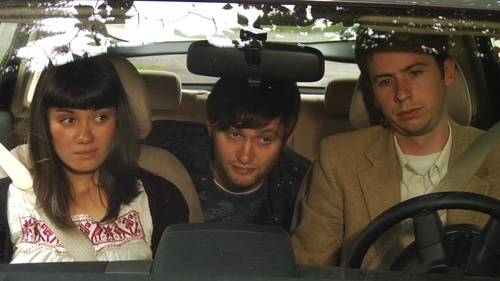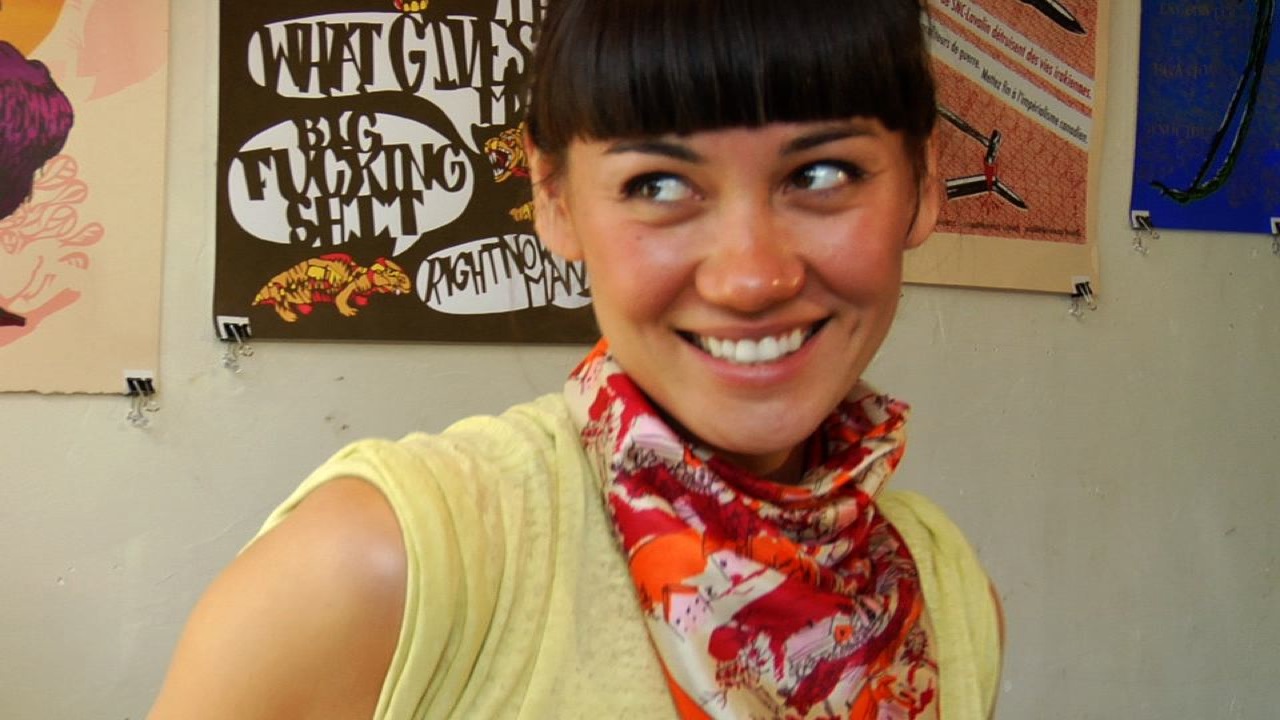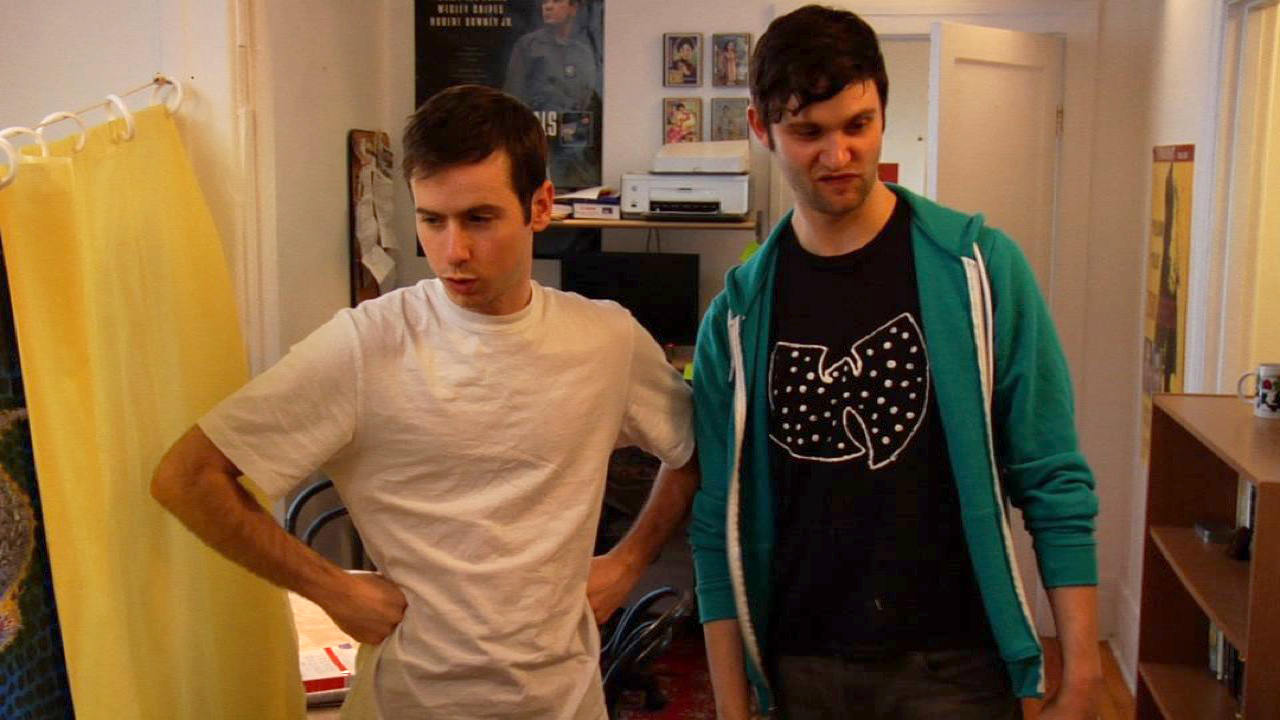
The Bitter End
A Web sitcom set in Montreal exposes the discomfort and disappointment in everyday situations.
Last August, I accepted a date’s invitation to watch his improv troupe perform at a small theatre in downtown Montreal. I’m not a big theatre-goer and my only previous experience of improvised comedy was TV’s dorky, self-conscious Who’s Line Is It Anyway?, so I was dubious, but I figured any guy who invites me to his improv show after one date has got guts, at the very least; besides, he’d talked about the show and I was intrigued. It was called The Bitter End, and it was a live, improvised sitcom.
Now, sitcoms I know. As a child of the 80s, I grew up on Family Ties, Growing Pains and The Facts of Life, so I know that situation comedy is probably the most formulaic of genres, following a pattern so set that it allows for hardly a moment to be spent outside the service of set-up and joke, plot, subplot, and an inevitable “what are the odds?” culmination. I couldn’t imagine where you could find room in there for the wild card of improvisation. Unless the improvisers could, like, read each other’s minds, I thought. Unless they knew the genre so well they all moved instinctively in any given moment to fulfill the requirements of its ironclad form. In short, unless they were consummate storytellers.
I arrived alone and took a seat near the back, nervously shredding the label of my beer. The first episode of The Bitter End had drawn a decent crowd, but I didn’t know what to expect. What if it was awkward? What if it was excruciatingly awkward?
The lights went down; the lights came up. The premise was classic: a mismatched pair. (After a decade of misbehaving and a stint in rehab, Les Price moves in with younger brother Bernard while he gets back on his feet. Les is selfish, immoral, and overconfident, while Bernard is naïve, insecure, and over-serious.) There were laughs. I laughed. It was funny. Surprising. Excruciatingly, hilariously, awkward.

As the episode unfolded, I understood why show creators Brent Skagford, Dan Beirne and Etan Muskat had chosen a sitcom instead of the more traditional games-based short-form improv. Watching Wayne Brady invent a groovy single on the spot is impressive, sure, and Colin Mochrie and Ryan Stiles can really crack themselves up sometimes, but as a member of the audience, you can only laugh so long before you need something else to hold your attention. The cast of The Bitter End – creators Skagford, Beirne and Muskat, along with Vanessa Matsui and Marc Rowland – did seem to read each other’s minds; did move at every point to complete the requirements of the form; were, in short, consummate storytellers. The audience was enthralled, at once at home in the genre and excited to see it being what it never used to be: unpredictable.
The episode wrapped up in the standard twenty-two television minutes with Les and Bernard having navigated their humorous hijinks as surely as the Seavers or Tootie and the gang. Except that it was dark. And painful. And kind of dirty.
I haven’t followed a weekly TV show since I was a teenager with nothing to do on weeknights until I could get my driver’s license, but Thursday after Thursday, as summer turned to fall turned to bitter Montreal winter, I found myself making the trek downtown for the next installment of The Bitter End. And I wasn’t the only one. As word spread, the show’s fan base grew, and the following spring, after 20 live episodes, the Bitter End team decided it was time for a bigger venue: the internet.
In the spring of 2009, on $3,000 from the province of Quebec and donations of space, labour and materials from friends and loyal fans (Rice Krispie squares by yours truly), the team wrote, designed, cast and produced six “webisodes” of The Bitter End. Since the first episode went live on September 24, the show has had thousands of hits, mainly out of North America and Europe, but with new audiences appearing in Latin America, Russia, Asia and the Middle East.
I realize, of course, that sitcoms have grown up since my TV-watching heyday. The genre that brought us I Love Lucy, M*A*S*H*, and Alex P. Keaton is now the province of 30 Rock, The Office and Arrested Development. Add to these Curb Your Enthusiasm and Britain’s Peep Show among The Bitter End’s influences.
Skagford, who plays Les in the show, observes, “It seems we often write ineffectual adult men that act like children and have a strong sense of entitlement.” Director of the Web series (and aforementioned gutsy date) Muskat adds, “Because we’ve created characters that we want to see suffer, we can take a certain pleasure in it.”
This desire to expose the discomfort and disappointment in every-day situations is one of the reasons it was important for the main characters of The Bitter End to be brothers. Les and Bernard (who is played by Beirne) work at cross-purposes, have nothing in common, and push each other to the brink of disaster on a regular basis, but they’re family, so it’s normal. Says Beirne, “It's about how the people who are closest to you can fuck your life up the most.” But it’s the closeness of that relationship that lends believability to the idea that Les and Bernard would go through the things they do and stay in each other’s lives. “Unlike Friends,” Muskat says, “which was on for like ten years. They just like to hang out and it’s sort of inexplicable why they’re still together and why they don’t make other friends.”
As for their own relationship, Beirne says of his partners, “Working together has become kind of a given at this point. It's rare to find people with whom you share sensibilities in this way.” The trio says they’d like to keep making the show, eventually moving onto TV. In the meantime, an all-new live show is set to start sometime this year.
This much I can tell you: The Bitter End is funny, smart, and well-composed; and it makes a great second date.
The Bitter End can be streamed on thebitterend.tv and original content host blip.tv, or downloaded as an iTunes podcast.





